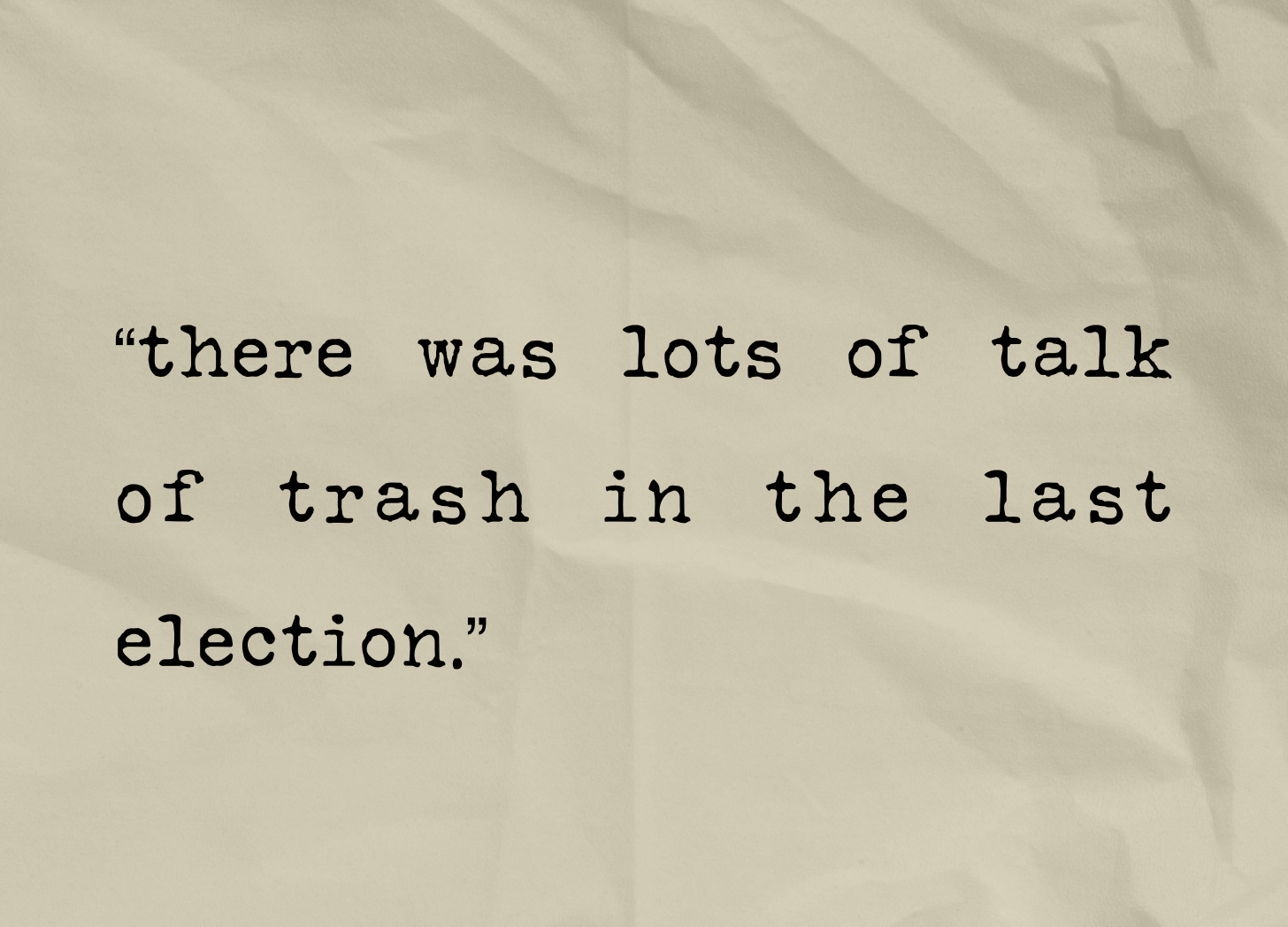Wit and Wisdom
by Beth Broderick
Can we talk about trash? It is a subject that consumes many of my thoughts. I am borderline obsessive about it. I save food scraps in compostable bags in my refrigerator until they are full enough to be placed in one of the green bins that frequently line the streets alongside their blue and black bin brethren. I divide recycling carefully and rinse it, if need be, with runoff water saved from cleaning the dishes.
It is an endless source of frustration for me that the folks who live on this street are blithely ignorant of what goes where. They do not know or do not seem to care about how these separate trash receptacles are intended to function. It makes me insane when I approach a green bin with my carefully curated compost items, only to find that some careless person has thrown two plastic Starbucks cups and a bunched-up bag full of God-knows-what into the bottom of it and yes, I have stood there, tipping the thing over and thrusting myself inside trying to retrieve the offending items.
I have done that.
As I said, this stuff makes me crazy.
It also depresses me. I mean, if we cannot muster the collective will to get this task–which could not be easier, really–accomplished (simply sort and place in the correct bin), then how will we ever resolve the big-picture challenges that we face as a nation and a world community? Is it possible that folks just cannot figure it out? If so, how to help?
I have fantasies about making public service announcements for the City of Los Angeles. I would recruit stalwart celebs like Tom Hanks to demonstrate what goes where. My film would be titled Let’s Talk Trash. I would deliver the voice-over for this in my sultriest tones. We would celebrate on camera the joys of putting things in their rightful place. Maybe that would make it fun, like a toddler’s game of match-the-shapes in a 3D puzzle. I have seriously thought about petitioning the City of Los Angeles for the funding to do this.
This is not a problem that is unique to L.A. When I had a home in Austin, Texas—the notorious “blueberry in a sea of red” city–folks there were just as confused and/or careless. The introduction of composting bins in my old neighborhood was considered deeply suspect by many. They were not going to put food scraps in a bin without sealing them in plastic, which is, of course, not biodegradable and therefore defeats the purpose and contaminates the bin. Others just thought they got a new receptacle as a thoughtful gift from the folks at City Hall and proceeded to fill it with regular trash.
The lids of those cans were labeled with words and pictures of what was supposed to go inside. One merely needed to read the very large lettering on top or take in the meaning of the correlating picture of veggies/food-stained cardboard, etc. But no. No one had the will to think it through or enough sense of civic duty to bother implementing the new rules.
The principles of composting are simple and a great solution to the problem of food rotting in landfills, which is a significant source of greenhouse gases. Once the foodstuffs have gathered in the appropriate bin, they can be processed down, then dehydrated, and the residue can be used as a first-rate fertilizer. We can reduce harm and enhance our plant life. Easy-peasy. Win-win. Why God, why, won’t folks cooperate with this?
The human race is sometimes plagued by a severe case of dipshittery. Sigh.
Egypt, which was once the cradle of civilization, has long been home to a tribe of people who handle trash with great care. The Zabbaleen are a Christian sect who collect trash from the city of Cairo and carefully recycle and reuse as much as 80 percent of it. Well, they do so when they are allowed to operate in their preferred fashion. Organic materials are fed to their pigs, while synthetics are refashioned into plastic pellets, which are shipped to China. Metals and glass are remade into salable items. Jewelry is made from pop-tops and Nescafé pods. The people who do this work are largely regarded as outcasts in society at large, though they are very familiar to the folks whose homes they service. It is customary to offer payment of some kind, though there are no hard-set rules around that.
When I was in Cairo for two months of filming, the system had broken down. There had been a global alert about an outbreak of “Swine Flu” and, in an act of religious zealotry, a group of Muslim men used that occasion to raid the Zabbaleen village and slaughter their prized pigs. This deeply offended the trash collectors, and service was disrupted for quite some time. I was astonished to see garbage piled up as high as six feet on street corners, and stray cats wandering in and out of it. This later prompted the government to try to take over trash service entirely–an effort which was thwarted by the fact that the trucks they bought for this purpose were too large to drive down the streets and alleyways.
Yes, the folks who gave us math, arts, and sciences failed to think that through. Being, therefore, unable to make a dent in the ever-growing piles of refuse, as big as cottage homes, the city once again engaged the full services of the Zabbaleen people. They live and work in a city/slum outside of Cairo. The work is hard and dangerous, but they do it with pride. Their children are vulnerable to disease and have no opportunity to attend school, and there does not seem to be any will toward addressing that. Still, theirs is a rich culture, and they are very aware that they are providing a much-needed and much-admired service.
CLEAN UP YOUR ACT.
If all goes according to plan in America, which, of course, it never does, we have the capacity to recycle around 28% of our garbage. It does not matter where you live–red state, blue state, or whatever-color-you-want-to-call-it state–this simple task is not being taken seriously, and that is a shame.
On a recent stay to look after my dog Fairness, my pet-sitter/buddy Rob decided to save me from myself by throwing away all of my clean, empty cottage cheese containers. His reasoning was that since one cannot readily see what’s inside, they are a nuisance. I love Rob, OCD and all, but this is the kind of thing that makes me want to lie down and pound my fists and feet on the floor. Why not take the time to label them? A simple piece of masking tape with some lettering would do this well. I reuse every piece of plastic I come into contact with. I refuse it until it cannot be reused, until it has broken down or become overly contaminated. I rinse off any piece of tin foil I come into contact with and repurpose it.
I have a system, willy-nilly though it may seem, and I like it that way.
I have many friends who think my attitude toward trash is over the top, borderline nutter, and I am okay with that. What they don’t realize is that I am trying to compensate the planet for their lack of concern. I am doubling down on my efforts toward recycling in an attempt to tip the scales a bit, to bend them toward a cleaner, safer environment. I am using old cottage cheese containers because I KNOW that my friends, like Rob, will not. I am labeling for the team.
The word “trash” has a pretty routinely negative connotation in American lingo. Some folks who live in mobile homes are called “trailer trash.” The term “white trash” has thankfully fallen out of favor, but it was used to describe white families who were as poor and uneducated as their neighbors of color were supposed to be, which, of course, boiled down to a matter of opportunity or lack thereof. Good riddance to that term. Then there is the girl who’s inclined to enjoy the attentions of men, and for this, she gets herself a ‘trashy’ reputation. This moniker is, more often than not, given to her by the very men who stand to benefit from her proclivities. Makes no sense, but there you have it.
There was lots of talk of trash in the last election. One fellow designated a whole island nation as trash. Another claimed the only trash he knew of was the folks in the audience who heard those remarks. Yet another kept decrying that it was “time to take out the trash.” Folks dressed up in trash bags–the heavy-duty black plastic kind, the kind that never breaks down, the kind that pollutes for eternity. They proudly sported them with neatly tied belts and clever shoes. I am going to leave that there.
All of this behavior showed a lack of respect for trash. I am offended on trash’s behalf.
We need to treat our refuse with respect and care and maybe take a lesson from the Zabbaleen playbook. They can go to sleep at night knowing they helped to make the world a cleaner, safer place. If we can just develop an iota of concern about our planet and the creatures who inhabit it. If we can learn to span the one-foot space between the different-colored bins and place our trash in the correct one, well … I am pretty sure that if we can get that right, we can evolve in other important ways too.
Meanwhile, that crazy lady halfway inside the bin that you saw out of the corner of your eye could very well be me. I am aware that I am weird and—well—who cares? I am trying to do the right thing. I will never do it perfectly, never not contribute to the problem in some small ways, but I am determined to be a part of the solution whenever and however I can.
I am a trashy kind of a gal, and I am not sorry.
On we go …
We extend our heartfelt gratitude to our valued subscribers whose support makes the publication of Wit and Wisdom possible. Thank you!

















Share this post